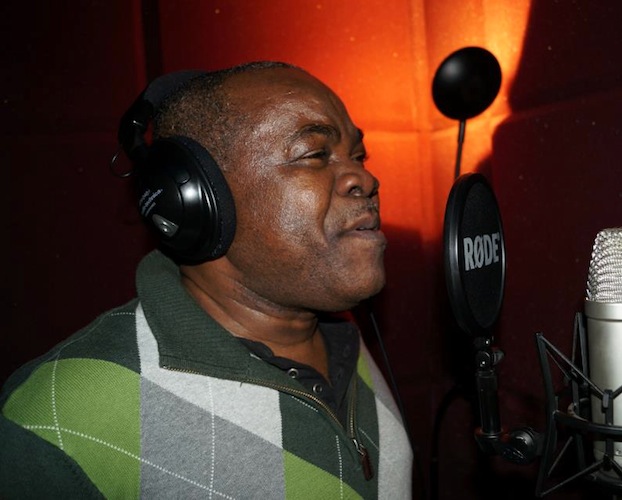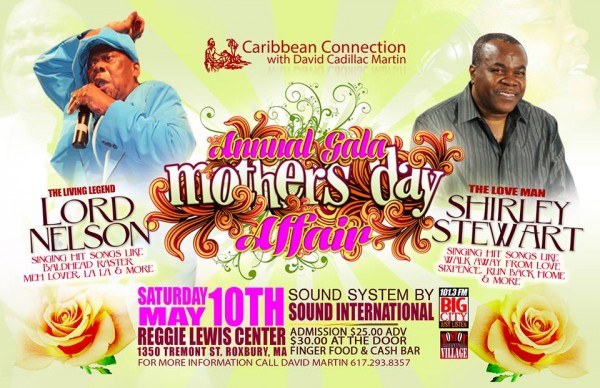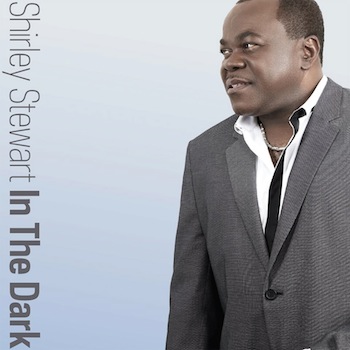Music Interview: From Spouge to Soul — The Bajan Journey of Shirley Stewart
A former Medford resident, singer Shirley Stewart will be returning for a career retrospective, part of the Caribbean Connection Mother’s Day Affair tomorrow in Boston.
By Noah Schaffer
One of the great buried treasures of Caribbean music is spouge, a frenetic, Latin-tinged mix of rocksteady, soul, and calypso that exploded out of Barbados in the late ’60s and early ’70s. Among the genre’s stars were the Escorts, who created bawdy anthems, “Sixpense” among them, R&B scorchers like “Never Ending Love,” and covers of American country and western hits, such as the Shel Silverstein-penned “Sylvia’s Mother.”
After the genre’s demise, member Shirley Stewart went on to co-write and record the iconic Caribbean soul ballad “Walk Away from Love.” A former Medford resident, Stewart will be returning for a career retrospective, part of the Caribbean Connection Mother’s Day Affair on May 10 at the Reggie Lewis Center, 1350 Tremont St., where a live band will back Stewart and 84-year old calypso legend Lord Nelson.
Recently I caught up with Stewart at his home in New York for a conversation about his long and eclectic career.
Arts Fuse: I had no idea you used to live in Boston.
Shirley Stewart: I came to this country in 1979 and moved to Boston. I was scuttling between Boston and New York when I wrote “Walk Away from Love” and then recorded it in Brooklyn.
AF: So one of the biggest songs in the history of Barbados was written and recorded in the U.S.?
Stewart: We did it in 1984 at a studio in downtown Brooklyn – it was more of a rock studio. I went in there Sunday evening and recorded it and did the song in one take. When I was done the whole studio broke into applause. The engineer said ‘Shirley, the only thing you can do with this song is f*** it up.’ That song has taken me around the world ever since. I was never able to get it released internationally or get a major recording contract, but I suppose at some point it may happen so the rest of the world can hear it.
AF: You co-wrote it with Richard Walters, who was also in the Escorts.
Stewart: We went to school together, and we’re still best friends to this day. He knew my story – the song was a very personal song about a relationship I was having – it was why I left Barbados. I wrote two verses and the chorus then got stuck. I sang it for him and he wrote the third verse right on the street! When you have a best friend who knows you inside and out it’s not hard.

Performing in Boston: Shirley Stewart, who co-wrote and recorded the iconic Caribbean soul ballad “Walk Away from Love.”
AF: Did the song start to get played on the radio and at dances right away?
Stewart: Right after it was released I got a call from Barbados. Some friends had taken it to the Voice of Barbados radio station and the DJ played it and then played it again and the rest is history. So someone called and told me that you put out a song and people are calling it a “golden oldie.” At the time that upset me tremendously because the song was only three months old! I didn’t realize that when they said that it meant the song had legs, that it was going to last. It took me a while to see it as a compliment. The song brought me home – the government brought me home twice to perform it during Cropover [the Barbados carnival season] … It took me by surprise and I thank god that it happened. I just released it to keep my name alive because when you leave a place a whole different generation comes up that doesn’t know anything about you.
The song was most popular in Guyana. It was known as the unofficial Guyanese national anthem! I’ve never had an opportunity to sing there but now I’m talking to some promoters and looking to put together a tour there.
AF: Were you active in music when you were here in Boston?
Stewart: Yes, I sang with an alternative rock band called Duncan Idaho. I think those guys got the name from a movie. These guys were from Medford, we got some work, and then we all drifted apart, some got married. The drummer, Chris Anzalone, was just a teenager. Now he’s a really active musician who gets a lot of gigs. They helped me with a song called “Don’t Rain on My Parade” which I recorded – it’s on iTunes but there was never really an opportunity for the general public to hear it.
AF: As a teenager you had a group called the Escorts – also known as the Escorts International to avoid confusion with a U.S. soul group called the Escorts. The group had a lot of hits in the spouge style. One was sort of a bawdy nursery rhyme called “Sixpense.” Was that record controversial?
Stewart: Yes, the third member of the Escorts was Jack Lee – he lives around Boston now. [Lee has a long-running North Shore reggae outfit – Jack Lee and Diversity.] He and his brother Jeffrey Lee, they knew the song from elementary school, so we put it together and took it to the radio station, which put it on air without listening to it. It was a play on words, you know? So halfway through the song the guy took it off and they banned it instantly. Anytime you ban a song you know what’s going to happen. I got one of the best checks I’ve ever seen. It was a hit throughout the Caribbean. [Jamaican singer] Pluto Shervington recorded it after we did. And the funny thing is I recorded one of his songs, “I Man Bitter,” not knowing it was his song!
AF: Spouge is the only music which is native to Barbados, but it faded out in the ’70s in favor of calypso and reggae and now soca and dancehall. Why did it disappear?
Stewart: It was simple. The musicians stopped playing it. The Draytons Two split up. [Member Lew Drayton now lives in Hartford.] We felt that we had to try R&B, calypso, reggae, so we stopped paying attention to the original sound. If we’d continue to push it and encourage younger musicians to push it things might have been different. But there’s still room – all old things come back new. I’m happy to say I’m one of the only singers out of the Caribbean to have a hit reggae song (“I Man Bitter”), a hit calypso song (“Lookin’ Good”), and a hit ballad (“Walk Away from Love”). I recorded a song in New York called “Run Back Home” which has been a big hit in Barbados among ballroom dancers.
AF: You’ve had a few reunions with the Escorts.
Stewart: Everyone drifted apart so it was years before we played together again. About ten years ago we had a show in St. Thomas Parish. They were doing shows highlighting every parish, so when it came to St. Thomas Parish’s culture they contacted us, and I tell you the road was blocked! Then we did a show for Barbados Independence in Brooklyn about two years ago. But it’s hard to get everyone back because we’re all off doing different things.
AF: Are you glad you came to the U.S.?
Stewart: Yes. I came because I had met a woman, and I wanted to see how far I could go in the music business, and I knew the U.S. would be the place to do that. So even though I never reached a Rhianna status, I can look back and not have to say ‘what if’ because I did come here. I assimilated and joined the work force; I still work for Time Warner in between flying here and there to perform. I never gave up my day job, but I plan to do that in the near future because that was the reason for coming here — the opportunity.
Over the past 15 years Noah Schaffer has written about otherwise unheralded musicians from the worlds of gospel, jazz, blues, Latin, African, reggae, Middle Eastern music, klezmer, polka and far beyond. He has won over ten awards from the New England Newspaper and Press Association.
Tagged: Lord Nelson, Shirley Stewart, calypso, rocksteady, soul



This guy should have gotten more accolades, damn!